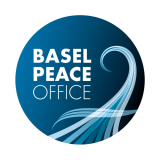The Basel Peace Office is established to advance research, teaching and policy-development programs dedicated to international peace, conflict resolution and security to achieve the global abolition of nuclear weapons.
The Basel Peace Office works on a number of programs including:
- the Climate-Nuclear Nexus;
- Engaging Legislators;
- Humanitarian consequences and the law, including Nuclear weapons in UN Human Rights Bodies;
- Legal Alternatives to War (LAW not War)
- Mobilizing an Earth Governance Alliance;
- Move the Nuclear Weapons Money;
- NoFirstUse Global;
- Nuclear Games;
- Nuclear-Weapon-Free Zones;
- Peace, nuclear Abolition and Climate Engaged Youth (PACEY) Award
- Sports and Peace;
- UNFOLD ZERO;
- Youth Fusion.
The Basel Peace Office brings international organisations to Basel that have a long record of successful work on international security and nuclear disarmament.
Founding organisations
On August 16th 2012 the Basel Peace Office was founded by the Canton of Basel-Stadt, the University of Basel Sociology Seminary of the Department of Social Sciences, swisspeace and International Physicians for the Prevention of Nuclear War Switzerland (IPPNW) together with their international partners World Future Council (WFC), Global Security Institute (GSI), Middle Powers Initiative (MPI) and Parliamentarians for Nuclear Non-proliferation and Disarmament (PNND). In 2016, Schweizer Anwälte für Nukleare Abrüstung (the Association of Swiss Lawyers for Nuclear Disarmament) joined as a member organisation of the Basel Peace Office.
Membership
The Members of the Basel Peace Office are approved at the Annual General Meetings. They comprise representatives of the co-sponsoring organisations plus nominated members.
The Basel Peace Office serves as the Basel-Kanton representative for Mayors for Peace, and is a member of:
- Abolition 2000, the global civil society network to abolish nuclear weapons;
- EU Non-Proliferation and Disarmament Consortium Network, which brings together foreign policy institutions and European research centres to encourage political and security-related dialogue.
- International Peace Bureau.
About the logo
The Basel Peace Office logo was designed by Jana Ware and Alyn Ware. It represents the Rhine river and a bridge across the river. The Rhine is a central feature of Basel serving as a scenic beauty, a method of transport, a source of water and electricity, and a place to swim and cool off in the summer. Bridges, both historic and new, are also a famous feature of Basel, linking communities on both sides of the river – creating bridges for peace.
The seven overlapping strands making up the river in the Basel Peace Office logo represent the seven partner organisations – the World Future Council, Middle Powers Initiative, Global Security Institute, Parliamentarians for Nuclear Nonproliferation and Disarmament, swisspeace, IPPNW Switzerland and the University of Basel Sociology Department. The logo shows the strands mixing together in cooperation – producing the range of Basel Peace Office programs and activities - as the water flows under the bridge. The Canton of Basel, represented by the bridge, connects the organisations and programs.
The Basel Peace Office logo is reminiscent of the Basel Canton emblem which symbolizes a bishop's crozier and dates back to 999 when Basel began being ruled by prince-bishops.The Basel Peace Office logo is embraced within a circle representing the world and indicating the emergence of Basel as a key player in world affairs.
Policies on sexual harrassment, equality, inclusion and respect in the workplace
Basel Peace Office has a policy against sexual harrasment in the workplace and a set of guidelines on preventing sexual harrassment. Basel Peace Office also has policy on equality, inclusion and respect in the workplace.
Support
The Basel Peace Office relies on donations and grants in order to undertake its programs. Please contact info@baselpeaceoffice.org if you would like to make a donation.
The Basel Peace Office thanks the following for their financial support:
- Canton of Basel-Stadt - Office of the President
- Grassroots Foundation (Germany)
- Quaker Peace and Service (New Zealand)
- NonProliferation Research (UK)
- Reformed Evangelical Church of Basel-Stadt
- The Simons Foundation (Canada)
- World Future Council
- Individual donors Prof (em) Dr Andreas Nidecker (Switzerland), Gray Southon (New Zealand) and others
Annual reports
2025
- President's Report
- Director's Report
- Financial Report
- Workplan for 2026
- Budget for 2026
- Board Members elected at the AGM
2024
2023
- President's Report
- Director's Report
- Financial Report
- Budget for 2024
- Work Program and Events for 2024
- Draft Minutes of the 2023 AGM
2022
- President's Report
- Director's Report
- Financial report - interim
- Budget for 2023
- 2023 Work program and key events
2021
- President's Report
- Director's Report
- Financial report
- Budget for 2022
- Work program for 2022
- 2021 AGM Minutes
2020
- President's Report
- Director's Report
- Financial Report
- Budget for 2021
- Work program for 2021
- Minutes 2020 AGM
2019
- President's Report
- Director's Report
- Financial Report
- Budget for 2020
- Work program for 2020
- Draft AGM Minutes 2019
2018
2017
- President's Report
- Director's Report
- Financial Report
- Budget for 2018
- Work program for 2018
- Draft minutes of the AGM
2016
- Report of the President
- Report of the Director
- Financial Report
- Budget for 2016-2017
- Draft minutes of the AGM
2015
- Report of the President
- Report of the Director
- Work program for 2015-2016
- Financial report
- Budget for 2015-2016
- Draft minutes of the AGM
2014:
- Report of the President
- Report of the Director
- Work program and key events: Dec 2014 - Nov 2015
- Financial report: income and expenses
- Minutes of the Annual Meeting
2013:
